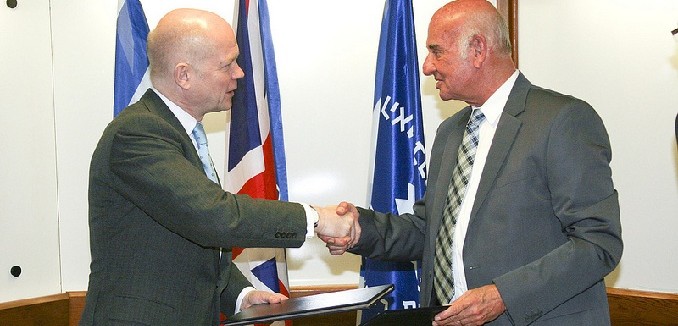British Foreign Minister William Hague signed a memorandum of understanding with Israel’s Minister of Science, Technology and Space, Yaakov Peri, yesterday, cementing the scientific cooperation between the two countries:
In a ceremony at the Hebrew University on Thursday, attended by British Ambassador to Israel Matthew Gould, the ministers inked the document that sets out five priority areas of science cooperation between the UK and Israel: advanced materials and nano-technology; agri-sciences with a focus on water; neuroscience; space research; technology; and regenerative medicine. “Both the UK and Israel are scientific superpowers, and many of our universities and academics are already doing tremendous work together,” Hague said.
The ceremony was framed as a repudiation of fringe efforts to boycott and divest from Israel:
Minister for Science, Technology and Space Yaakov Peri said: “Despite the fact that there are people in British academia who call to boycott Israel, the British government shows that it acknowledges the importance of scientific collaboration with Israel and is interested in expanding our co-operation on our path to excellence”.
The ceremony also acknowledged the progress of BIRAX – Britain Israel Research Academic Exchange – and confirmed 30 new BIRAX fellowships. Earlier this year BIRAX announced a major five year grant in support of stem cell research.
Evaluating efforts to boycott Israel last month, National Post Managing Editor for Comment Jonathan Kay declared that it had “accomplished less than nothing” and described why:
From the slogans emitted by BDS champions (including, at times, Canada’s own Naomi Klein), one would think that BDS was on the cusp of bringing Israel to its knees. Yet since 2004 — the period corresponding to the lifespan of the BDS movement — Israel’s economy generally has been booming, especially in the areas of telecommunications, computer technology, aviation, specialty medical equipment, military hardware and natural gas.
Kay specifically called attention to the gap between fringe student and activist organizations, which have in isolated cases passed boycott calls, and institutions actually empowered to set trade and science policies.
[Photo: UK in Israel / Flickr]




